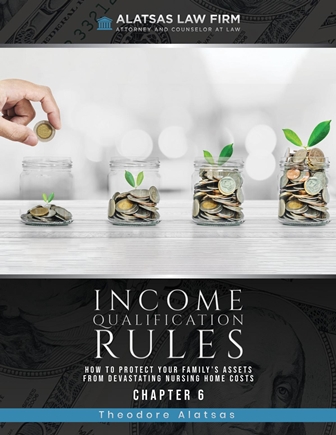
With the average annual cost of long-term nursing care reaching six figures, staying in a nursing home can quickly exhaust your family's assets, leaving nothing for your beneficiaries after your death. Unless you're extremely wealthy and can cover long-term care expenses on your own, you're likely counting on Medicaid to help pick up the tab. That's not surprising, as the program is the most common source of funding for nursing home care. However, as a needs-based program, Medicaid has strict income eligibility rules that can make qualifying for long-term nursing care benefits tricky. Fortunately, Alatsas Law Firm is here to help.
We Wrote the Book on Medicaid Planning
Our knowledgeable and experienced New York estate planning attorney has written a comprehensive guide to help clients with their Medicaid long-term care planning goals. In How to Protect Your Family's Assets From Devastating Nursing Home Costs, the Income Qualification Rules chapter offers information on:
- The maximum monthly income individuals and married couples can make and still qualify for Medicaid
- Exceptions and allowances
- How a Miller Trust can help you qualify for Medicaid if you live in an income-cap state
- Meeting Medicaid's income qualification criteria in a spend-down state
- And much, much more
This chapter is available now, as a complimentary preview of our guide.
Contact Us Now to Request Your Free Chapter
Complete the form below to request the information you need to make sense of Medicaid's complex income qualification rules. We'll deliver your free chapter directly to your inbox, then follow up with you to answer your questions and send you the full version of our Medicaid book, How to Protect Your Family's Assets From Devastating Nursing Home Costs.
